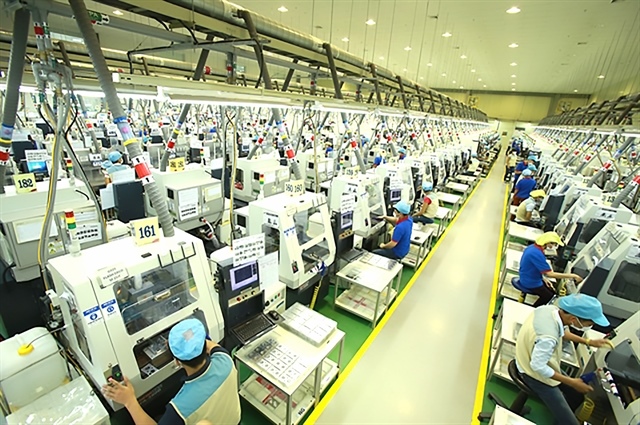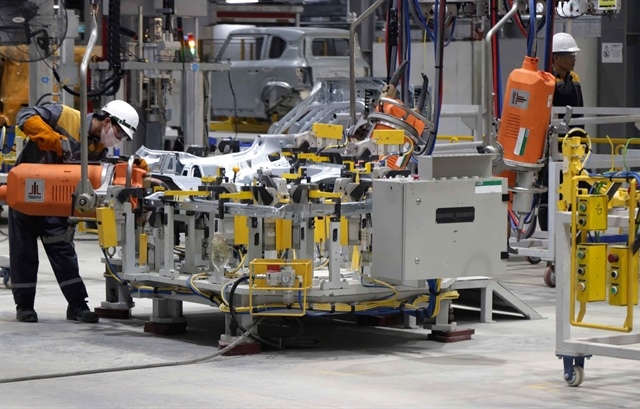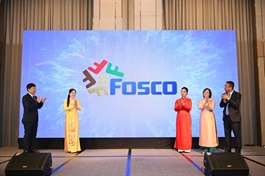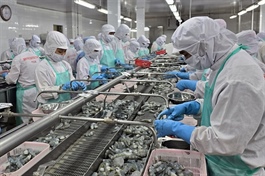Electronics industry seizes restructuring opportunities
Electronics industry seizes restructuring opportunities
The export turnover of electronics reached US$134.5 billion last year.

Workers at an electronic parts ensemble in Thái Nguyên Province. — VNA/VNS Photo |
Việt Nam is gradually transforming from a manufacturing hub into a regional centre for high-tech innovation.
The country currently ranks fifth in the world for electronics, computers and components exports, and second globally for mobile phones and components exports.
The export turnover of electronics reached US$134.5 billion last year.
The electronics industry continued its strong growth momentum with exports reaching $60.8 billion as of the end of May this year, a year-over-year increase of 39 per cent, reinforcing its role as a key driver in the country's export economy.
The Tài chính (Finance) online newspaper quoted Trần Hồng Quân, chief commercial director of RX Tradex Vietnam, as saying that major technology corporations such as Samsung, Apple, LG and Pegatron, were continuing to expand their large-scale investments in Việt Nam.
Notably, Qualcomm has launched its R&D centre in the country, while NVIDIA recently signed a strategic partnership with the Government to establish a data centre and an AI R&D centre.
A significant highlight is the Government’s adoption of the semiconductor industry development strategy to 2030, with a vision toward 2050, marking a decisive move to strengthen domestic capabilities, from workforce training and localisation capacity to active participation in core technology research and production.
However, Quân pointed out that Việt Nam’s electronics industry still faced several challenges.
He said: “100 per cent of mobile phone export value comes from FDI enterprises, 80 per cent of phone components are imported, and over 90 per cent of Tier-1 suppliers are foreign companies. R&D within domestic firms remains limited, mainly focused on assembly.”
Quân emphasised that these challenges marked a turning point to evolve from a centre of assembly into a country with advanced, value-added manufacturing capabilities.
Experts highlighted three core issues that were shaping the future of the electronics industry.
First, the country is emerging as a strategic destination in the global supply chain. Second, the government is making strong efforts to promote the development of the semiconductor industry and R&D.
Third, the rapid advancement of artificial intelligence (AI) and automation is fundamentally transforming the nature of manufacturing, requiring both technological standardisation and investment in human resources.
Regarding the export market of the electronics industry, Đỗ Thị Thúy Hương, vice president of the Vietnam Association for Supporting Industries (VASI), stated that the US was Việt Nam’s largest export market, accounting for approximately 29 per cent of the country’s total export turnover.
In particular, the electronics industry accounts for more than 40 per cent of exports to the US in certain segments.
Việt Nam’s exports of electronic machinery, equipment and audio devices to the US reached $41.7 billion last year alone, making up 34.9 per cent of the country’s total export turnover to the US.
High tariffs from the US could increase production costs for Vietnamese enterprises, affecting both profit and competitiveness, said Hương.
In this context, experts believed that Việt Nam’s electronics industry had an opportunity to restructure its supply chain, accelerate digital transformation, and expand markets through free trade agreements (FTAs) and cross-border e-commerce.
A representative of IPC, an association connecting electronics industries based in Chicago, US, said that with its mission to strengthen the electronics supply chain and promote sustainable growth across the industry, the association had implemented several important initiatives to support the global electronics sector, including in Việt Nam.
These efforts include updating IPC standards for electronics companies, advocating for public policy and providing training and certification.
Among these, IPC standards play a crucial role in ensuring the quality, reliability and consistency of electronic manufacturing.
Their implementation has helped improve production processes and contributed to the creation of higher-quality electronic products.
Adherence to international standards has opened up access to new markets for Vietnamese electronics manufacturers.
The association’s training programmes have helped build a highly skilled workforce capable of meeting the demands of advanced manufacturing technologies, enhancing the reputation and international recognition of Vietnamese enterprises.
- 08:19 14/07/2025



























